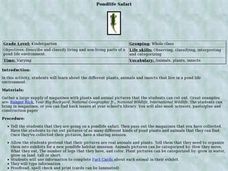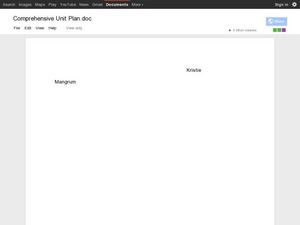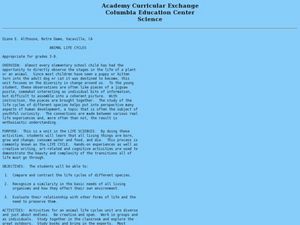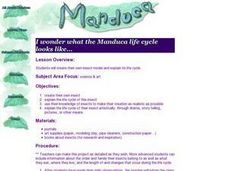American Museum of Natural History
Journey to Deep Sea Vents
Take a deep dive into oceanography. The online interactive allows for learners to board a submersible to dive to the bottom of the ocean to investigate sea vents. On the way down, individuals see different marine life at different...
NOAA
It's a Roughy Life
Scientists recently discovered several previously unknown species at the Bear Seamount off the coast of New England. Scholars research these new species — benthopelagic, benthic, and seamount fish — and find out what makes them...
Virginia Department of Education
Isotopes
Lead your class through the amazing world of isotopes as they investigate the various properties they contain and further understand their respective location on the periodic table. They explore half-lives and radioactivity as each...
Wilderness Classroom
Ocean Life
Our oceans are composed of many complex relationships. Young oceanographers explore relationships between organisms, understand the world ocean's currents, and discover the effects of water pollution and how it behaves. There are...
Curated OER
Salmon Life Cycles
Students list salmon life cycle stages in order, list three threats that salmon face throughout their lives, and examine important role native fish play in aquatic food chains throughout their life cycles.
Curated OER
Ocean Life
Students explore the topics of ocean water salinity, ocean life zones, marine life classification, and ocean food chains. They observe demonstrations, conduct experiments, complete quizzes and handouts, and analyze key vocabulary.
Curated OER
Living or Non-Living
Students examine living and non-living things. In this life science instructional activity, students are given a group of objects and discuss if they are living or non-living. Students identify and list characteristics of living things.
Curated OER
A Frog's Life Story
Students investigate the lives of frogs by completing several worksheets. In this biology lesson, students discover the life cycle of a frog from tadpole to death. Students complete frog life cycle puzzle as well as create a...
Curated OER
Half-Life
In this half-life worksheet, students are guided through the steps of solving radioactive decay problems. They solve nine problems finding rates of decay, half-life and quantities of substances remaining after given amounts of time.
Curated OER
Pond-life Safari
Students determine the living and non-living parts of pond life. In this pond life lesson, students examine the plants, animals, and insects that live in ponds. They look through a variety of print media, cut out pictures, and arrange...
Curated OER
The Life Cycle of the Mealworm
Fourth graders provide a habitat for live mealworms and observe their life cycle. In this animal life cycle and scientific inquiry lesson, 4th graders create a habitat for a live mealworm and observe and record related data as it grows....
Curated OER
The Game of Life
Students explore the game of life which refers to what happens to a species when most of the population is gone. In this endangered species lesson, students describe what it means for a marine animal to be endangered. Students then...
Curated OER
Animal Life Cycle
Students conduct hands-on experiments. For this life cycle lesson, students are able to observe a variety of animals as they travel through their life cycle (brine shrimp, mealworms, frog eggs and chicken eggs). Students respond to...
Curated OER
Cycles of Life in an Urban Habitat: Changes in Biodiversity
Second graders compare and contrast animate and inanimate objects. In this environmental science activity, 2nd graders create simple food webs. They observe their environment and create a collage about it.
Curated OER
Animated Video Productions - Life Cycles
Seventh graders compare/contrast the life cycles of free-living organisms to that of parasites. They conduct Internet research, illustrate the stages of a specific organisms's life cycle, and direct and produce a mini-video production.
Curated OER
I Wonder What the Manduca Life Cycle Looks Like
Students create their own insect, build a model of it and explain its life cycle.
Curated OER
Science Fiction Stories
Students write a story. For this genre lesson, students read a science fiction story and discuss its characteristics. Students brainstorm a list of things that if scientifically changed would alter the way we live our lives. Students...
Curated OER
Life Processes
Students identify life processes and create their own creature. For this creative science lesson, students identify an organism's life processes and categorize them into groups. They then create their own creature and write about how it...
Curated OER
Terrariums: A Look at the Living and Nonliving World
Third graders examine life in a terrarium and relate it to life in a larger environment. In this terrarium lesson plan, 3rd graders examine how living and non-living things work together by examining the changes in a terrarium. They make...
Curated OER
A Bug's Life
In this biology instructional activity, students create a presentation for a museum about the children they encounter during their journey as an insect. They identify the types of food the insect eats and its habitat. Students also...
Curated OER
Life Cycle: Diversity in a Balance
For this life cycle workbook, 3rd graders complete several different activities in which they analyze different invertebrates, identify arthropods, examine human biology and plants, and study natural environments. 20 different...
Curated OER
'O'opu Life Cycle
Students investigate the life cycle of the 'o'opu also known as Hawaiian gobies. In this amphidromous living lesson, students discuss the reproductive cycle, create props and an obstacle course to demonstrate the importance of the...
Curated OER
Life Cycle of Hawaii's Honu
Students simulate the life cycle of Hawaii's Honu. In this Science lesson, students act out the life cycle of the Hawaiian sea turtle. Students determine and play the roles of prey and predator.
Curated OER
Marine Life Protected Areas in the O.C.
Young scholars research a Marine Protected Area and determine the species' that benefit from its protection. In this marine lesson students present their findings to the class using PowerPoint.

























